Joining puzzle groups can be a powerful tool for anxiety relief. You'll benefit from social connection through shared activities, providing a low-pressure environment to interact with others. Puzzles offer mindful distraction, shifting your focus away from anxious thoughts. As you solve puzzles together, you'll experience a sense of accomplishment and progress, boosting your confidence. The supportive group setting reduces stress and fosters new friendships. Regular participation establishes a comforting routine and predictability. You'll also develop cognitive and collaborative skills while engaging in a safe space designed for anxiety sufferers. Exploring this unique approach could reveal new strategies for managing your anxiety.
Social Connection Through Shared Activity
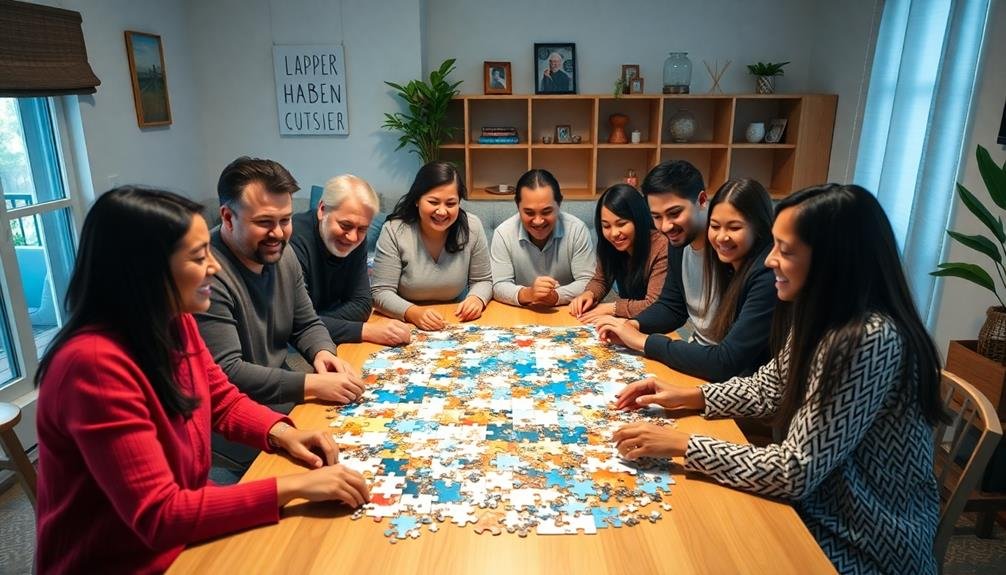
Why do puzzle groups offer such effective anxiety relief? One key reason is the social connection they provide through shared activity. When you join a puzzle group, you're not just solving puzzles; you're engaging with others who share your interest. This social interaction can be a powerful antidote to the isolation often associated with anxiety.
In a puzzle group, you'll find yourself naturally conversing with others as you work together on a common goal. This shared focus helps to shift your attention away from anxious thoughts and onto the task at hand. You'll experience a sense of camaraderie as you and your fellow puzzlers celebrate small victories and overcome challenges together.
Moreover, these groups offer a low-pressure social environment. There's no need for constant conversation or eye contact, as the puzzle provides a natural focal point. This can be especially beneficial if you find traditional social situations overwhelming.
As you become more comfortable with your group, you may find your confidence in social interactions growing, potentially reducing your overall anxiety in other areas of your life.
Mindful Distraction From Anxious Thoughts
When you're working on a puzzle in a group setting, you're naturally drawn into the present moment.
You'll find your mind focusing on the task at hand, effectively shifting away from anxious thoughts.
This engagement in a positive, shared activity can provide a welcome respite from worry and stress.
Focus on Present Moment
Jigsaw pieces scatter across the table, demanding your full attention. As you sift through the colors and shapes, your mind narrows its focus to the present moment. You're no longer dwelling on past regrets or future worries; instead, you're immersed in the task at hand. This shift in mental focus is a powerful tool for anxiety relief.
When you're engaged in puzzle-solving with a group, you'll find yourself naturally practicing mindfulness. Your thoughts center on:
- Finding the right piece
- Identifying patterns and connections
- Collaborating with others
- Celebrating small victories as the image takes shape
This intense concentration on the present moment helps break the cycle of anxious thoughts. You're not ignoring your worries; you're simply giving your mind a much-needed break. As you fit pieces together, you're also piecing together a sense of calm and control.
The act of puzzling in a group setting amplifies this effect. You're not just focusing on the puzzle; you're also engaging with others, sharing a common goal, and building connections. This social aspect further anchors you in the present, providing a multi-faceted approach to anxiety relief.
Engage in Positive Activity
Engaging in puzzle groups offers more than just a pleasant pastime; it's a powerful tool for mindful distraction from anxious thoughts. When you immerse yourself in solving puzzles with others, you're actively redirecting your focus away from worry and towards a positive, goal-oriented activity.
As you work on jigsaw puzzles, crosswords, or logic games, your brain becomes absorbed in the challenge at hand. This engagement naturally pushes anxious thoughts to the background, giving your mind a much-needed break from rumination.
The collaborative nature of puzzle groups adds an extra layer of positivity, as you're surrounded by like-minded individuals who share your interest. The sense of accomplishment you feel when completing a puzzle, whether individually or as a team, boosts your mood and self-esteem.
This positive reinforcement can help counteract negative thought patterns associated with anxiety. Additionally, the social aspect of puzzle groups provides opportunities for light, enjoyable conversation, further distracting you from anxious thoughts and fostering a sense of connection with others.
Sense of Accomplishment and Progress
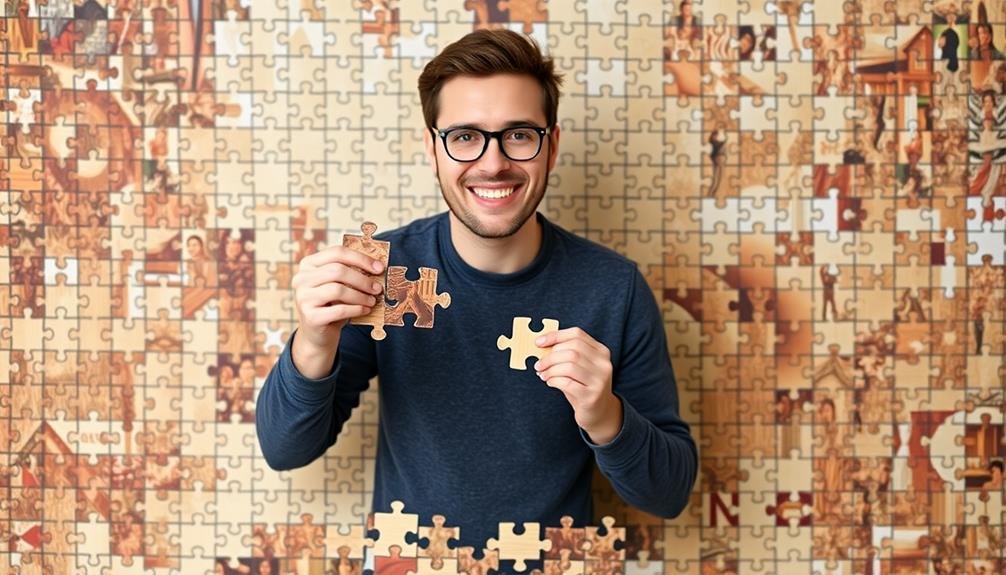
When you complete a puzzle, you're achieving a measurable goal, which can boost your confidence and reduce anxiety.
As you fit pieces together, you're engaging in step-by-step problem-solving, creating a sense of progress and control.
This gradual advancement towards a clear objective can provide a tangible feeling of accomplishment, reinforcing your ability to overcome challenges.
Measurable Goals Achieved
Setting measurable goals in puzzle groups provides a concrete way to track your progress and experience a sense of accomplishment.
You'll find that setting specific targets, like completing a certain number of puzzles or mastering a particular difficulty level, can greatly boost your motivation and reduce anxiety. As you achieve these goals, you'll gain confidence in your abilities and feel a sense of control over your challenges.
Puzzle groups often incorporate goal-setting activities that help you:
- Break down larger objectives into manageable steps
- Celebrate small victories along the way
- Learn from setbacks and adjust your strategies
- Develop a growth mindset and resilience
Step-By-Step Problem Solving
Tackling puzzles step-by-step in a group setting offers a powerful way to build problem-solving skills and reduce anxiety. As you work through each puzzle, you'll learn to break complex problems into manageable parts. This approach mirrors effective anxiety management techniques, teaching you to address overwhelming issues piece by piece.
In puzzle groups, you'll develop a systematic approach to challenges. You'll start by identifying the puzzle's goal, then gather necessary information, and finally implement strategies to reach the solution. This process strengthens your ability to face real-life problems with confidence and clarity.
You'll also benefit from the group dynamic. Watching others tackle puzzles step-by-step can provide new perspectives and problem-solving methods. You'll learn to collaborate, share ideas, and support one another through difficult sections. This teamwork builds social connections and reduces feelings of isolation often associated with anxiety.
As you progress through puzzles of increasing difficulty, you'll gain a sense of accomplishment with each step. This incremental success boosts self-esteem and reinforces your ability to overcome challenges, both in puzzles and in life, ultimately helping to alleviate anxiety symptoms.
Stress Reduction in Group Settings
Group dynamics play an essential role in stress reduction during puzzle-solving activities. When you join a puzzle group, you'll experience a unique blend of social interaction and mental stimulation that can notably lower your anxiety levels. The shared focus on a common goal creates a supportive environment where you can forget your worries and immerse yourself in the task at hand.
In a group setting, you'll benefit from:
- Collective problem-solving skills
- Emotional support from fellow puzzlers
- A sense of belonging and community
- Opportunities for social interaction
As you work together to solve puzzles, you'll find that the group's energy helps dispel negative thoughts and promotes a positive mindset. The collaborative nature of puzzle groups encourages communication and teamwork, which can boost your confidence and self-esteem.
You'll learn to approach challenges with a calmer, more rational perspective, and this skill will extend to other areas of your life.
Moreover, the regular social interaction in puzzle groups can combat feelings of isolation and loneliness, which are often associated with anxiety. By engaging in a shared activity, you'll form meaningful connections with others who share your interests, creating a supportive network that extends beyond puzzle-solving sessions.
Cognitive Benefits of Puzzle Solving
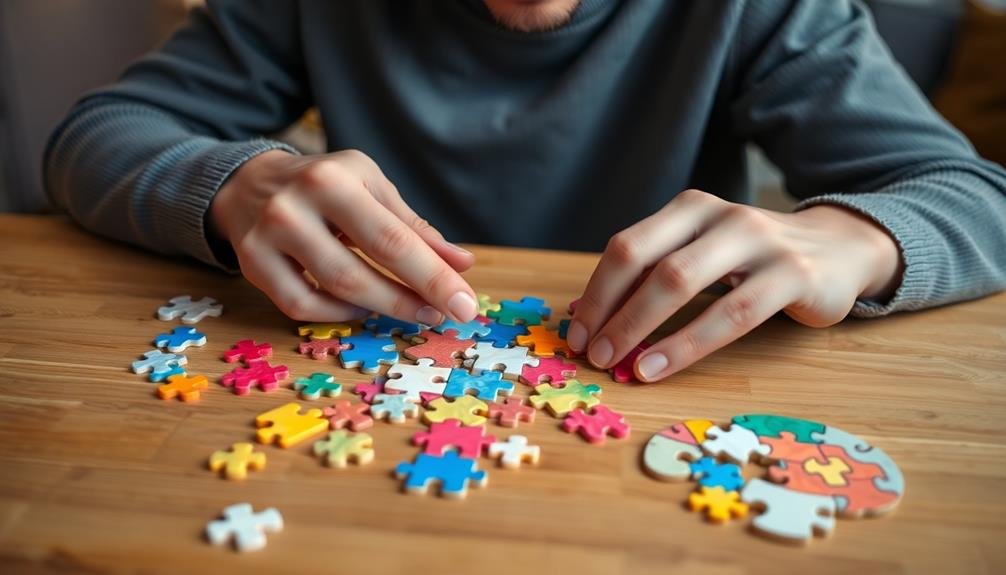
When you engage in puzzle solving, you're not just having fun—you're sharpening your mind.
You'll find your problem-solving skills growing stronger as you tackle increasingly complex puzzles, learning to approach challenges from different angles.
Additionally, your memory function will improve as you exercise your brain, helping you retain information more effectively in your daily life.
Enhances Problem-Solving Skills
Puzzle enthusiasts often find their problem-solving skills sharpening with each challenge they face. As you engage in regular puzzle-solving activities, you'll notice improvements in your ability to tackle complex problems in various aspects of life.
This enhanced skill set can help you approach anxiety-inducing situations with a clearer, more analytical mindset.
When you join puzzle groups, you're exposed to a wide variety of puzzles that exercise different cognitive abilities. These challenges help you:
- Develop systematic approaches to problem-solving
- Improve your ability to break down complex issues into manageable parts
- Enhance your pattern recognition skills
- Boost your creative thinking and ability to find alternative solutions
Improves Memory Function
Regular engagement in puzzle-solving activities can greatly boost your memory function. When you participate in puzzle groups, you're constantly exercising your brain, which helps strengthen neural connections and improves your ability to recall information. You'll find that as you work on various puzzles, you're not just solving them in the moment, but also storing patterns, strategies, and solutions for future use.
Different types of puzzles target specific areas of memory:
| Puzzle Type | Memory Type | Benefits |
|---|---|---|
| Crosswords | Semantic | Enhances vocabulary recall |
| Jigsaw | Visual-spatial | Improves image recognition |
| Sudoku | Working | Boosts short-term memory |
As you tackle these puzzles regularly, you'll notice improvements in your everyday memory tasks. You might find it easier to remember names, dates, or where you've placed items. The social aspect of puzzle groups adds another layer of memory enhancement, as discussing strategies and solutions with others reinforces learning and recall. By consistently challenging your brain in a group setting, you're not only relieving anxiety but also fortifying your memory function for long-term cognitive health.
Structured Environment for Social Interaction
Creating a structured environment for social interaction is a key benefit of puzzle groups for anxiety relief. When you join a puzzle group, you're entering a space where social interactions are centered around a shared activity. This focus can help reduce the pressure and anxiety often associated with unstructured social situations.
In puzzle groups, you'll find:
- A common goal that unites participants
- Clearly defined roles and expectations
- Opportunities for collaboration without forced conversation
- A relaxed atmosphere that allows for gradual social engagement
The structured nature of puzzle groups provides a comfortable setting for those who struggle with social anxiety. You're not expected to maintain constant conversation; instead, you can interact at your own pace while working on the puzzle. This setup allows you to build connections naturally, as you share in the collective achievement of completing the puzzle.
Moreover, the predictable environment of a puzzle group can help you feel more in control, reducing anxiety triggers. You'll know what to expect each time you attend, making it easier to prepare mentally and emotionally for the social interaction.
Non-Verbal Communication and Bonding
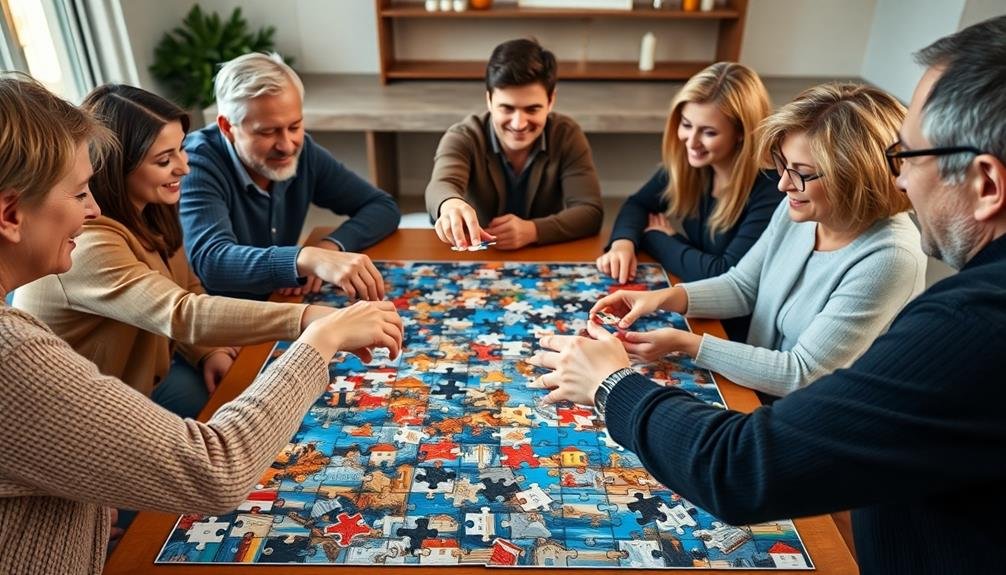
A significant aspect of puzzle groups that aids in anxiety relief is the opportunity for non-verbal communication and bonding. When you're working on a puzzle together, you don't need to engage in constant conversation. Instead, you can communicate through actions, gestures, and shared focus. This non-verbal interaction can be particularly comforting if you struggle with social anxiety or find verbal communication challenging.
As you collaborate on solving the puzzle, you'll naturally develop a sense of camaraderie with your fellow puzzlers. You'll exchange glances of triumph when pieces fit, share sighs of frustration when faced with challenges, and experience collective excitement as the image takes shape. This silent bond can be incredibly powerful in reducing anxiety, as it fosters a sense of belonging without the pressure of forced conversation.
Moreover, the shared goal of completing the puzzle creates a unifying purpose. You're all working towards the same objective, which can help you feel connected to others without the need for extensive personal disclosure.
This non-verbal bonding experience can leave you feeling more relaxed and socially fulfilled, even if you haven't spoken much throughout the session.
Collaborative Problem-Solving Skills Development
While non-verbal communication plays a key role in puzzle groups, the act of solving puzzles together also hones your collaborative problem-solving skills. As you work on complex puzzles with others, you'll learn to approach challenges from different angles and combine diverse perspectives. This process enhances your ability to tackle real-life problems more effectively.
In puzzle groups, you'll develop skills that transfer to various aspects of your life:
- Active listening: You'll learn to pay attention to others' ideas and suggestions.
- Constructive feedback: You'll practice offering and receiving input in a supportive manner.
- Resource allocation: You'll discover how to distribute tasks based on individual strengths.
- Consensus building: You'll work on finding solutions that satisfy the whole group.
These collaborative skills can help reduce anxiety in your daily life by improving your confidence in handling challenges. You'll become more comfortable working with others, sharing ideas, and contributing to group efforts.
As you experience success in puzzle-solving, you'll gain a sense of accomplishment that can boost your overall self-esteem and resilience when facing anxiety-inducing situations.
Safe Space for Anxiety Sufferers
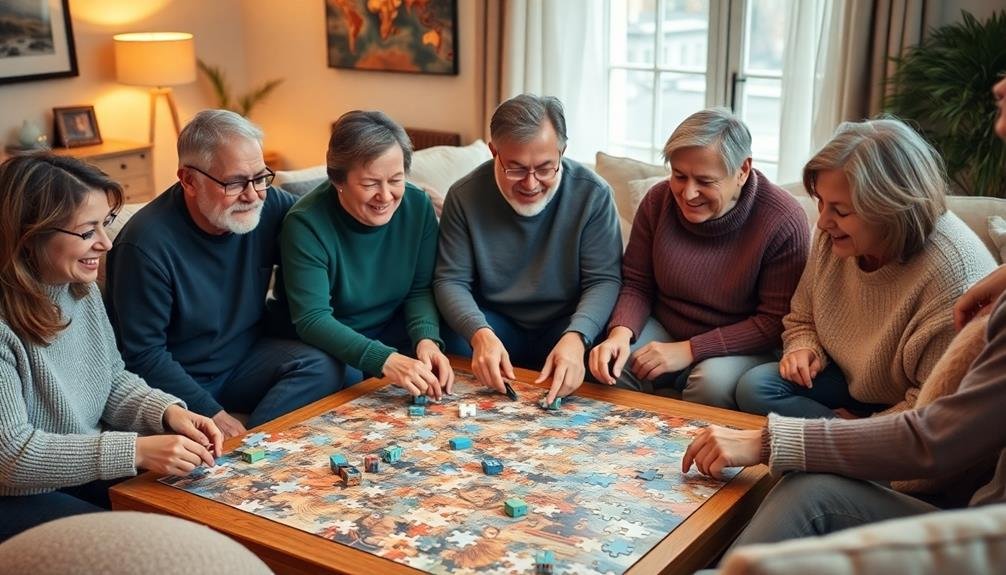
Puzzle groups offer a unique sanctuary for those struggling with anxiety. In these gatherings, you'll find a non-judgmental environment where you can focus on solving puzzles without the pressure of social interactions. The shared goal of completing a puzzle creates a sense of camaraderie without the need for extensive conversation, allowing you to ease into social situations at your own pace.
These groups provide a structured activity that can help redirect your anxious thoughts. As you immerse yourself in the puzzle-solving process, you'll likely experience a reduction in stress and worry. The repetitive nature of fitting pieces together can be meditative, promoting a sense of calm and control.
You'll also find that puzzle groups often have flexible attendance policies, allowing you to participate when you feel comfortable without the obligation of regular commitments. This low-pressure environment can help you build confidence in social settings gradually.
Additionally, the sense of accomplishment from completing puzzles can boost your self-esteem and provide a positive distraction from anxiety-inducing thoughts, making puzzle groups an effective tool in your anxiety management toolkit.
Regular Routine and Predictability
Many anxiety sufferers find comfort in the regular routine and predictability of puzzle groups. Knowing what to expect and having a structured activity can greatly reduce stress and anxiety levels. When you join a puzzle group, you'll quickly discover the calming effects of a consistent schedule and familiar faces.
The predictable nature of puzzle groups offers several benefits:
- You'll have a set time and place to focus on something enjoyable
- You can plan your week around this regular activity
- You'll develop a sense of belonging and community
- The routine helps create a sense of normalcy and stability
As you attend puzzle group meetings, you'll notice how the repetitive actions of sorting, connecting, and problem-solving pieces can be meditative. This rhythmic process allows your mind to relax and shift away from anxious thoughts.
The predictability of the puzzle-solving process itself can be comforting, as you know there's always a solution waiting to be discovered.
Fostering New Friendships and Support
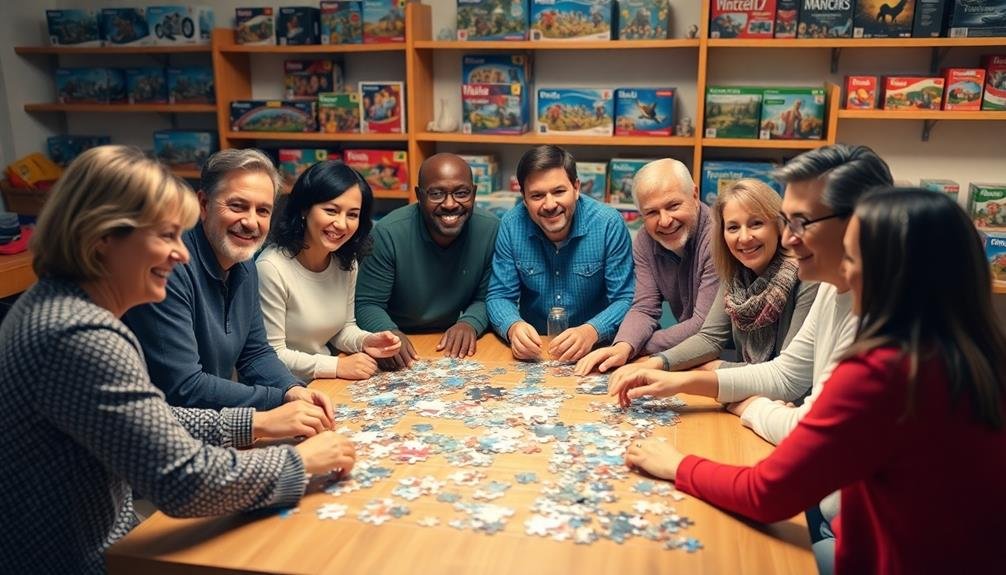
Beyond the comfort of routine, puzzle groups offer an excellent opportunity to foster new friendships and build a support network. You'll find yourself surrounded by like-minded individuals who share your passion for problem-solving. As you work together on challenging puzzles, you'll naturally develop bonds with your fellow puzzlers, creating a sense of camaraderie and belonging.
These new connections can provide invaluable support in managing your anxiety. You'll have people to turn to who understand your interests and can offer encouragement during difficult times. The shared experience of solving puzzles together creates a unique bond that can extend beyond the group meetings.
| Benefits | Social Aspects | Emotional Support |
|---|---|---|
| Shared interests | Group collaboration | Stress relief |
| Skill development | Meeting new people | Mutual understanding |
| Sense of achievement | Building relationships | Encouragement |
As you continue to participate in puzzle groups, you'll likely find that these friendships grow stronger over time. You may even discover that your anxiety symptoms lessen as you feel more connected and supported within your new social circle. The combination of mental stimulation and social interaction can be a powerful tool in managing anxiety and improving overall well-being.
Frequently Asked Questions
Are Puzzle Groups Suitable for All Age Ranges?
Yes, puzzle groups are suitable for all age ranges. You'll find groups catering to children, adults, and seniors. They offer activities tailored to different skill levels and interests. You're sure to find a group that fits your age and preferences.
How Often Do Puzzle Groups Typically Meet?
You'll find puzzle groups typically meet weekly or bi-weekly. Some gather monthly for longer sessions. It's common to see a mix of schedules, so you can choose one that fits your availability and preference.
What Types of Puzzles Are Usually Solved in These Groups?
You'll find puzzle groups tackling a variety of challenges. They often work on jigsaw puzzles, crosswords, and Sudoku. You might also encounter brain teasers, logic puzzles, and word searches. Some groups even explore escape room-style puzzles together.
Do I Need Prior Puzzle-Solving Experience to Join?
You don't need prior experience to join puzzle groups. They're typically welcoming to beginners. You'll learn as you go, and other members will often help you. It's a great way to start your puzzle-solving journey.
Are There Online Options for Puzzle Groups?
Yes, you'll find many online puzzle groups available. You can join virtual communities, participate in digital puzzle-solving sessions, and connect with fellow enthusiasts worldwide. These online options offer flexibility and convenience for your puzzle-solving passion.
In Summary
You've discovered a powerful tool for managing anxiety in puzzle groups. They offer social connection, mindful distraction, and a sense of accomplishment. You'll find stress relief, cognitive benefits, and improved problem-solving skills. These groups provide a safe space, routine, and new friendships. By joining, you're taking a positive step towards anxiety relief. Don't hesitate to give it a try – you might just find the missing piece in your anxiety management puzzle.

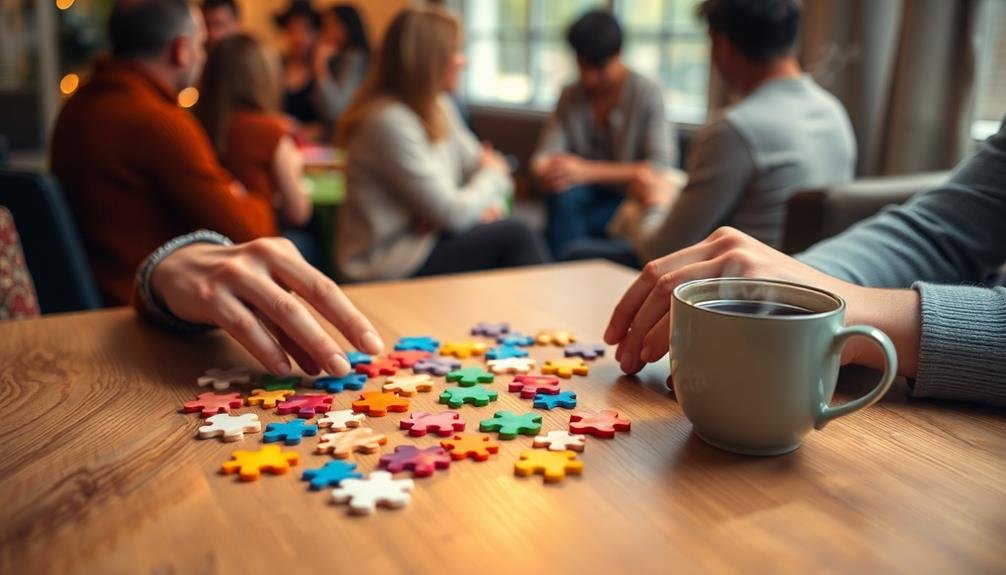



Leave a Reply